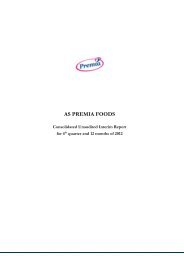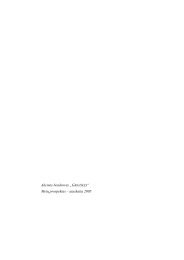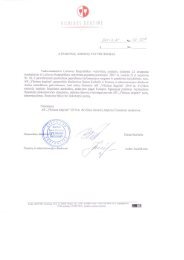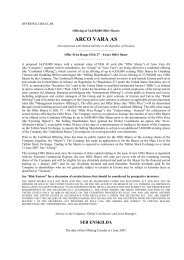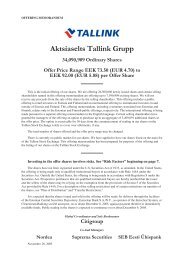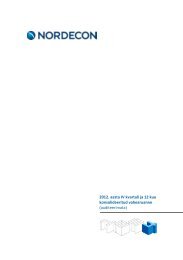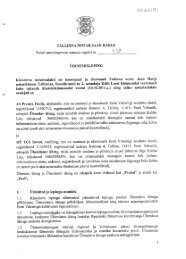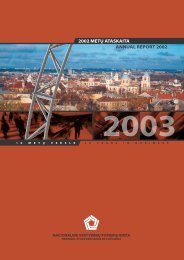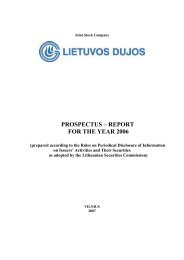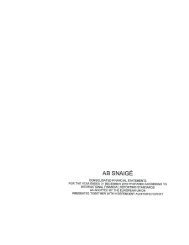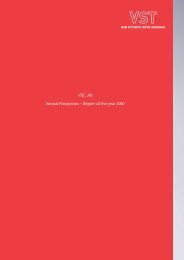AB „SNAIGĖ“ - NASDAQ OMX Baltic
AB „SNAIGĖ“ - NASDAQ OMX Baltic
AB „SNAIGĖ“ - NASDAQ OMX Baltic
You also want an ePaper? Increase the reach of your titles
YUMPU automatically turns print PDFs into web optimized ePapers that Google loves.
Consolidated annual report for year 2008<br />
PRINCIPLES/ RECOMMENDATIONS<br />
4.14. Audit Committee.<br />
4.14.1. Key functions of the audit committee should be the<br />
following:<br />
• Observe the integrity of the financial information provided<br />
by the company, in particular by reviewing the relevance<br />
and consistency of the accounting methods used by the<br />
company and its group (including the criteria for the<br />
consolidation of the accounts of companies in the group);<br />
• At least once a year review the systems of internal control<br />
and risk management to ensure that the key risks (inclusive<br />
of the risks in relation with compliance with existing laws<br />
and regulations) are properly identified, managed and<br />
reflected in the information provided;<br />
• Ensure the efficiency of the internal audit function, among<br />
other things, by making recommendations on the selection,<br />
appointment, reappointment and removal of the head of the<br />
internal audit department and on the budget of the<br />
department, and by monitoring the responsiveness of the<br />
management to its findings and recommendations. Should<br />
there be no internal audit authority in the company, the need<br />
for one should be reviewed at least annually;<br />
• Make recommendations to the collegial body related with<br />
selection, appointment, reappointment and removal of the<br />
external auditor (to be done by the general shareholders’<br />
meeting) and with the terms and conditions of his<br />
engagement. The committee should investigate situations<br />
that lead to a resignation of the audit company or auditor<br />
and make recommendations on required actions in such<br />
situations;<br />
• Monitor independence and impartiality of the external<br />
auditor, in particular by reviewing the audit company’s<br />
compliance with applicable guidance relating to the rotation<br />
of audit partners, the level of fees paid by the company, and<br />
similar issues. In order to prevent occurrence of material<br />
conflicts of interest, the committee, based on the auditor’s<br />
disclosed inter alia data on all remunerations paid by the<br />
company to the auditor and network, should at all times<br />
monitor nature and extent of the non-audit services. Having<br />
regard to the principals and guidelines established in the 16<br />
May 2002 Commission Recommendation 2002/590/EC, the<br />
committee should determine and apply a formal policy<br />
establishing types of non-audit services that are (a)<br />
excluded, (b) permissible only after review by the<br />
committee, and (c) permissible without referral to the<br />
committee;<br />
• Review efficiency of the external audit process and<br />
responsiveness of management to recommendations made in<br />
the external auditor’s management letter.<br />
4.14.2. All members of the committee should be furnished<br />
with complete information on particulars of accounting,<br />
financial and other operations of the company. Company’s<br />
management should inform the audit committee of the<br />
methods used to account for significant and unusual<br />
transactions where the accounting treatment may be open to<br />
different approaches. In such case a special consideration<br />
YES/NO<br />
/NOT<br />
APPLIC<strong>AB</strong>LE<br />
COMMENTARY<br />
NO Not formed. It is planned that recommendation will be<br />
followed after establishing an audit committee in 2009.<br />
Prepared by U<strong>AB</strong> FMĮ „Orion Securities“ p. 51



